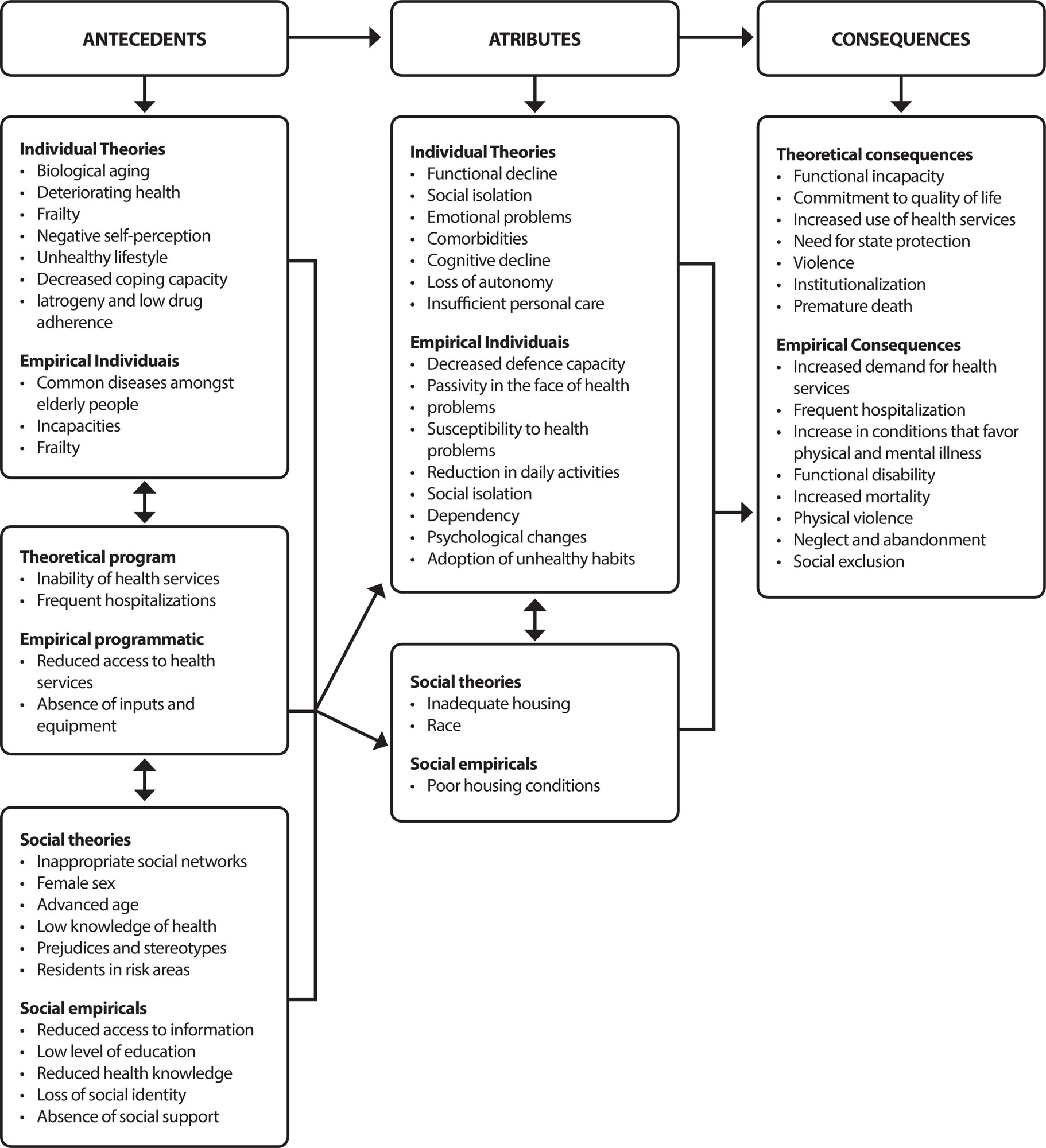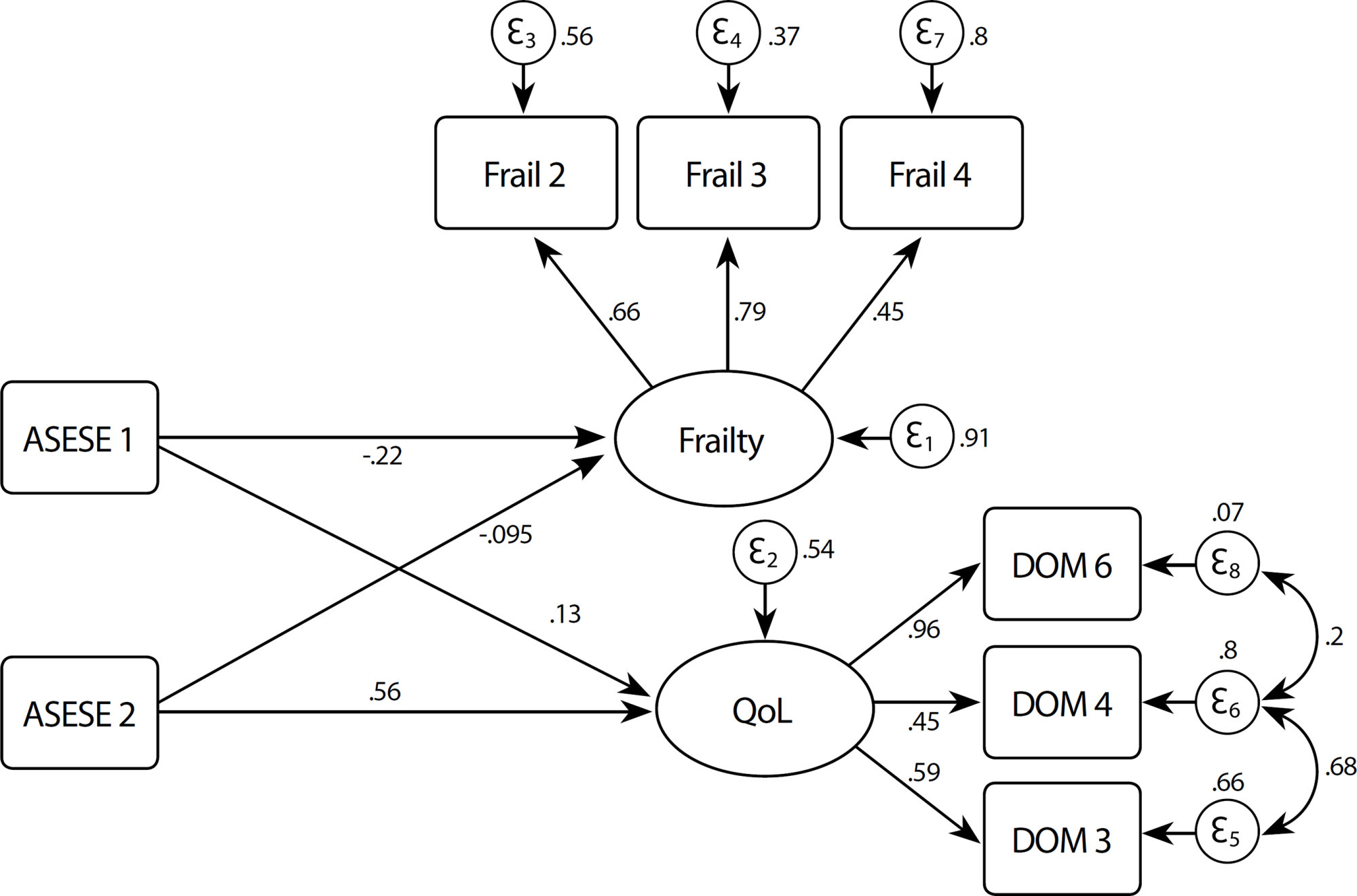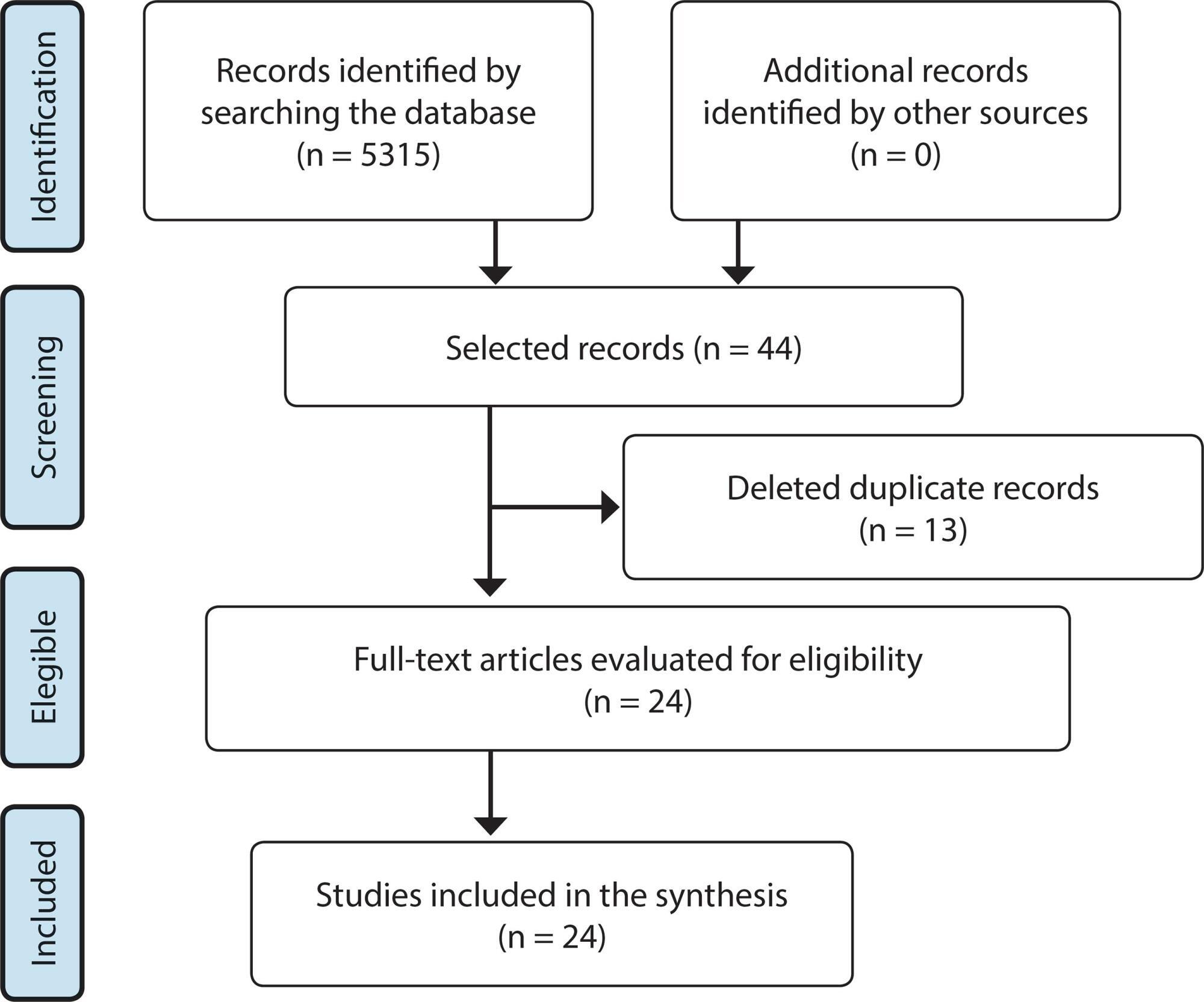-
ORIGINAL ARTICLE05-03-2024
Josicélia Dumêt Fernandes’ professional trajectory: contributions to psychiatric and mental health nursing
Revista Brasileira de Enfermagem. 2024;77(1):e20230174
Abstract
ORIGINAL ARTICLEJosicélia Dumêt Fernandes’ professional trajectory: contributions to psychiatric and mental health nursing
Revista Brasileira de Enfermagem. 2024;77(1):e20230174
DOI 10.1590/0034-7167-2023-0174
Views0See moreABSTRACT
Objectives:
to analyze nurse Josicélia Dumêt Fernandes’ life story, with emphasis on her work in the psychiatry and mental health fields.
Methods:
historical, qualitative research. Semi-structured interviews and documentary research were used as data collection techniques, collected from September to October 2021. For data analysis, we opted for the content analysis method and comparison with the Foucauldian philosophical framework.
Results:
four categories emerged: Transforming herself and mental health practices; (Re)framing professional practice; Nursing practice and power relations; and The paths and implications in the psychiatry and mental health fields.
Final Considerations:
the study of the biographer demonstrates a search for transformation of herself and mental health practices, with a rupture in paradigms and reframing of her practice in psychiatry and mental health.
-
ORIGINAL ARTICLE04-22-2024
Adherence to Covid-19 vaccination during the pandemic: the influence of fake news
Revista Brasileira de Enfermagem. 2024;77(1):e20230284
Abstract
ORIGINAL ARTICLEAdherence to Covid-19 vaccination during the pandemic: the influence of fake news
Revista Brasileira de Enfermagem. 2024;77(1):e20230284
DOI 10.1590/0034-7167-2023-0284
Views1See moreABSTRACT
Objectives:
to understand how fake news has influenced adherence to Covid-19 immunization, from the perspective of health professionals.
Methods:
a qualitative, descriptive-exploratory study was conducted in Campo Grande – MS. Twenty nursing professionals working in vaccine rooms or managing immunobiologicals participated through semi-structured interviews. The interviews were audio-recorded, fully transcribed, and subjected to thematic content analysis.
Results:
two categories emerged in which the professionals highlighted an increase in vaccine hesitancy among the population, influenced by fake news and denialist actions, which negatively interfered with the population’s trust in vaccines and in the professionals administering them.
Final Considerations:
concerns about vaccine safety and denialist actions by authorities and media outlets can contribute to the phenomenon of non-vaccination. The valorization of science, the promotion of educational actions, and raising public awareness about immunization were presented as strategies to increase vaccine coverage
-
ORIGINAL ARTICLE04-22-2024
Learning difficulties in school children: health and education professionals’ perceptions
Revista Brasileira de Enfermagem. 2024;77(1):e20230074
Abstract
ORIGINAL ARTICLELearning difficulties in school children: health and education professionals’ perceptions
Revista Brasileira de Enfermagem. 2024;77(1):e20230074
DOI 10.1590/0034-7167-2023-0074
Views0See moreABSTRACT
Objectives:
to understand health and education professionals’ perceptions regarding children’s learning difficulties in public schools.
Methods:
qualitative research, of the participatory action type, linked to Paulo Freire’s Research Itinerary. Forty-five professionals participated, through interviews and a Virtual Culture Circle. The analysis was developed through careful reading, reflection and interpretation of highlighted topics.
Results:
professionals discussed the (in)visibility of learning difficulties, strategies and resources in the educational sector and the search for solutions in the health sector. It was found that the production of complaints related to school learning is attributed predominantly as an individual problem of children or their family, exempting the educational institution from this process.
Final Considerations:
greater investment in professional training and development policies is urgently needed to facilitate coordination between sectors, with a view to overcoming outdated pedagogical and health models.
-
ORIGINAL ARTICLE04-22-2024
Mothers’ perception of the care of newborn in the home environment
Revista Brasileira de Enfermagem. 2024;77(1):e20230080
Abstract
ORIGINAL ARTICLEMothers’ perception of the care of newborn in the home environment
Revista Brasileira de Enfermagem. 2024;77(1):e20230080
DOI 10.1590/0034-7167-2023-0080
Views1See moreABSTRACT
Objectives:
to identify mothers’ perceptions about caring for newborns in the home environment, from the perspective of complexity thinking.
Methods:
qualitative, exploratory and descriptive research, carried out between November/2022 and February/2023. Data were collected through individual interviews with 21 mothers from southern Brazil who cared for newborns at home and analyzed using the thematic analysis technique.
Results:
the four thematic axes resulting from the data analysis: Living amidst order and disorder; embracing singularities; dealing with the certain and the uncertain; support network in the (re)organizing process demonstrate that the mother caring for a newborn in their home environment experiences a distinct and plural adaptive process, which must be welcomed and understood by health professionals who work within the family environment.
Final Considerations:
the care of newborns in a home environment, in the perception of mothers, requires differentiated attention and a formal or informal support network that considers the unique specificities of each woman/mother in the personal, family and social spheres. Therefore, in addition to the social support network, it is important to rethink home intervention approaches.
-
ORIGINAL ARTICLE04-22-2024
Nurses’ perception of the nursing process and its relationship with leadership
Revista Brasileira de Enfermagem. 2024;77(1):e20230371
Abstract
ORIGINAL ARTICLENurses’ perception of the nursing process and its relationship with leadership
Revista Brasileira de Enfermagem. 2024;77(1):e20230371
DOI 10.1590/0034-7167-2023-0371
Views0See moreABSTRACT
Objectives:
to describe Nurses’ perception of the Nursing Process and its relationship with leadership.
Methods:
action research conducted between September/2021 and April/2022 with nurses from a medium-sized hospital in southern Brazil. The data investigated, one of the stages of the method, was collected using the Focus Group technique and submitted to Strategic Focus Analysis.
Results:
three categories emerged from the organized and analyzed data, namely: Nursing Process: a tool that qualifies nursing care; Conditions that weaken the Nursing Process; and Strategies that enhance the Systematization of Nursing Care.
Final Considerations:
the perception of the Nursing Process and its relationship with leadership are not always understood as complementary themes. Although they recognize that the Nursing Process is sometimes imposed as normative, nurses do not perceive the importance of the role of the leader, who is considered a key player in conducting and boosting the Systematization of Nursing Care.

-
03-18-2024
Nursing rights in comics: educational technological innovation report
Revista Brasileira de Enfermagem. 2024;77:e20230438
Abstract
Nursing rights in comics: educational technological innovation report
Revista Brasileira de Enfermagem. 2024;77:e20230438
DOI 10.1590/0034-7167-2023-0438
Views0See moreABSTRACT
Objectives:
to report an educational technology construction on nursing professionals’ rights.
Methods:
an experience report on educational technology construction during the crediting of university extension hours in an undergraduate nursing course at a Brazilian public university, between March and June 2023. The Deming cycle was used as a procedural method.
Results:
four meetings were held between students and extension workers. Eight comic books were produced based on the Code of Ethics for Nurses, addressing professional autonomy, fair remuneration, risk-free work, denial of exposure in the media and others. The Deming cycle proved to be an important strategy for constructing products.
Conclusions:
nursing professionals’ rights must be discussed and improved. Educational technologies, such as comic books, provide playful and reflective learning.

-
ORIGINAL ARTICLE03-18-2024
Nurses’ workload during the COVID-19 pandemic: potential for experiences of moral distress
Revista Brasileira de Enfermagem. 2024;77:e20230200
Abstract
ORIGINAL ARTICLENurses’ workload during the COVID-19 pandemic: potential for experiences of moral distress
Revista Brasileira de Enfermagem. 2024;77:e20230200
DOI 10.1590/0034-7167-2023-0200
Views0See moreABSTRACT
Objectives:
to understand nurses’ experiences of moral distress related to work overload during the COVID-19 pandemic in Brazil.
Methods:
qualitative research, whose data collection occurred through individual interviews with 19 nurses who worked on the front line of COVID-19 in health services in southeastern Brazil. Data were analyzed using thematic content analysis.
Results:
work overload proved to be a powerful source of experiences of moral distress due to excessive working hours during vaccination, double working hours, a troubled relationship due to pressure from managers and the population and physical and mental exhaustion, which prevented nurses from act according to their judgment.
Final Considerations:
nurses’ work overload reflects on quality patient care and prevents nurses from acting in accordance with their moral principles, generating moral distress in nurses.
-
REVIEW03-15-2024
Resources for health literacy among caregivers of prematurely born children: a scoping review
Revista Brasileira de Enfermagem. 2024;77(1):e20230062
Abstract
REVIEWResources for health literacy among caregivers of prematurely born children: a scoping review
Revista Brasileira de Enfermagem. 2024;77(1):e20230062
DOI 10.1590/0034-7167-2023-0062
Views1See moreABSTRACT
Objectives:
to map the available evidence on resources used to promote health literacy among caregivers of prematurely born children during outpatient follow-up.
Methods:
the Joanna Briggs Institute’s scope review protocol was utilized. The search encompassed six databases, incorporating studies from 2012 to 2022.
Results:
the three included publications revealed that the resources employed are: mobile applications, phone calls, individual counseling, videos, educational pamphlets, and group discussions. Implementing an education protocol during the transition home enhances scientifically grounded health promotion rates.
Conclusions:
there is limited literature addressing the health literacy of these caregivers. The nursing team plays a crucial role in health education and in developing resources applicable to these families.

-
ORIGINAL ARTICLE06-18-2021
Predictors of moral harassment in nursing work in critical care units
Revista Brasileira de Enfermagem. 2021;74(3):e20200442
Abstract
ORIGINAL ARTICLEPredictors of moral harassment in nursing work in critical care units
Revista Brasileira de Enfermagem. 2021;74(3):e20200442
DOI 10.1590/0034-7167-2020-0442
Views0See moreABSTRACT
Objectives:
to analyze the predictors of moral harassment in nursing work in critical care units.
Methods:
a cross-sectional study conducted in a public hospital in Fortaleza, Ceará, with 167 nursing professionals in 2016. Sociodemographic/occupational questionnaire and Negative Acts Questionnaire Revised were applied. The analysis included descriptive statistics, measures of central tendency and dispersion, as well as Mann-Whitney, Kruskal-Wallis and Conover Inman U-tests for multiple comparisons.
Results:
there was a 33% prevalence of self-perception of moral harassment, highlighting personal/professional disqualification and work-related harassment. The predictors of moral harassment included age, time working in the job and time in the unit, employment relationship and sector.
Conclusions:
young professionals (< 30 years), cooperative, crowded in intensive care or emergency units, with less time working in the job (< 5 years) or greater time in the unit (above 10 years) are the biggest victims of moral harassment in the work of nursing in critical environments.
-
ORIGINAL ARTICLE10-23-2020
Elderly vulnerability: concept development
Revista Brasileira de Enfermagem. 2020;73:e20190897
Abstract
ORIGINAL ARTICLEElderly vulnerability: concept development
Revista Brasileira de Enfermagem. 2020;73:e20190897
DOI 10.1590/0034-7167-2019-0897
Views0See moreABSTRACT
Objective:
Propose the concept of vulnerability of the elderly based on the Hybrid Concept Development Model.
Method:
Methodological study with a qualitative approach, based on the theoretical-methodological framework of the Hybrid Concept Development Model. Initially, an integrative literature review was carried out, followed by empirical collection through semi-structured interviews with 12 professionals. As a method of analysis of the interviews, the Grounded Theory was used. The final analytical phase constituted the interface between theoretical and empirical evidence.
Results:
When carrying out the theoretical survey, it became possible to outline the attributes, antecedents and consequences of the studied phenomenon. After analyzing the empirical data, two phenomena emerged: Unveiling the multiple changes arising from the human aging process; and Understanding the multiple dimensions of the elderly person’s vulnerability construct.
Final considerations:
The vulnerability of the elderly person consists of a multifaceted construct, in which individual and collective conditions interact with each other.

-
ORIGINAL ARTICLE04-22-2020
Implementation of the protocol of nursing care in trauma in aeromedical service
Revista Brasileira de Enfermagem. 2020;73(3):e20180516
Abstract
ORIGINAL ARTICLEImplementation of the protocol of nursing care in trauma in aeromedical service
Revista Brasileira de Enfermagem. 2020;73(3):e20180516
DOI 10.1590/0034-7167-2018-0516
Views0See moreABSTRACT
Objective:
To analyze the implementation of a nursing care protocol for trauma patients before, during and after the flight.
Method:
A cross-sectional quantitative study carried out in an aeromedical service, using a checklist with 106 care: 79 before flight, 25 during, and 2 after flight. 97 patients were included in the study.
Results:
Most care (n = 59; 55.7%) was implemented, totaling 4,435, 1,480 and 192 cares performed before, during and after the flight, respectively. They stood out as unrealized care: protect ears with ear muffler (n = 55) and avoid leaving the pulse oximeter exposed to the sun’s rays (n = 22). The main reason for the non-performance was lack of appeal (n = 94).
Conclusion:
Although most protocol care has been implemented, unrealized care compromises the quality of care, which requires the management of the service to provide more incentive to nurses and adequate resources for its implementation.
-
ORIGINAL ARTICLE07-17-2020
Labyrinths of nursing training and the Brazilian National Mental Health Policy
Revista Brasileira de Enfermagem. 2020;73:e20190836
Abstract
ORIGINAL ARTICLELabyrinths of nursing training and the Brazilian National Mental Health Policy
Revista Brasileira de Enfermagem. 2020;73:e20190836
DOI 10.1590/0034-7167-2019-0836
Views0See moreABSTRACT
Objective:
to analyze the training of nurses from public and private educational institutions of the city of São Paulo from the perspective of the Brazilian Psychiatric Reform.
Methods:
a qualitative, descriptive-exploratory research, using as methodological framework documentary analysis of the pedagogical projects of the participating institutions and content analysis of the interviews carried out with mental health professors.
Results:
it was identified that most mental health courses had insufficient workload for adequate training; theory emphasized the study of mental disorders and drug treatment; practice, in some schools, was carried out in psychiatric hospitals. There were problems that interfered with the quality of the education offered.
Final considerations:
educational institutions still did not offer training in undergraduate nursing from the perspective of the Brazilian Psychiatric Reform.
-
ORIGINAL ARTICLE10-19-2020
Hemovigilance and patient safety: analysis of immediate transfusion reactions in elderly
Revista Brasileira de Enfermagem. 2020;73:e20190735
Abstract
ORIGINAL ARTICLEHemovigilance and patient safety: analysis of immediate transfusion reactions in elderly
Revista Brasileira de Enfermagem. 2020;73:e20190735
DOI 10.1590/0034-7167-2019-0735
Views0See moreABSTRACT
Objective:
To identify immediate transfusion reactions in elders hospitalized in a public hospital in the Federal District.
Methods:
This is an observational, retrospective, documental, and analytical research, with a quantitative analysis of 516 transfusions of packed red blood cells in elders hospitalized in the largest public hospital, who required blood components, from June to December 2017, through descriptive statistics.
Results:
The sample corresponded to 46.36% of the total number of transfusions in elders in the period. The mean age was 70 years old. There were adverse effects (reactions to the transfusion) in 12 (2.3%) transfusions. Respiratory alterations (33.3%) and fever (23.8%) were the most common events.
Conclusion:
The incidence of reactions to the transfusion is below national and international rates, indicating probable undernotification, which could be associated to a lack of knowledge regarding its clinical manifestations and the lack of systematic monitoring of the transfusion.
-
ORIGINAL ARTICLE07-01-2020
Knowledge of primary health care professionals on health policies for the riverside population
Revista Brasileira de Enfermagem. 2020;73(5):e20190080
Abstract
ORIGINAL ARTICLEKnowledge of primary health care professionals on health policies for the riverside population
Revista Brasileira de Enfermagem. 2020;73(5):e20190080
DOI 10.1590/0034-7167-2019-0080
Views0See moreABSTRACT
Objectives:
to analyze the knowledge of health professionals on the health policies for the riverside population; identify how health practices with this group are developed; and discuss facilitators and barriers for the implementation of these policies.
Methods:
qualitative and descriptive study with 24 professionals from the Riverside Family Health Strategy Teams in the city of Belém-Pará. Data were collected in individual interviews and analyzed by Content Analysis.
Results:
although professionals demonstrate knowledge about public health policies, there is a need to expand and strengthen knowledge about health policies for the riverside population. The activities directed to the communities took place in the Unit itself, and some did not occur due to insufficient material and human resources.
Final Considerations:
the greatest barrier for the organization of health care is the lack of material and human resources, and the most prominent facilitator was the union and cohesion of the health team.
-
ORIGINAL ARTICLE09-29-2022
Effects of sexuality on frailty and quality of life in the elderly: a cross-sectional study
Revista Brasileira de Enfermagem. 2022;75(1):e20210049
Abstract
ORIGINAL ARTICLEEffects of sexuality on frailty and quality of life in the elderly: a cross-sectional study
Revista Brasileira de Enfermagem. 2022;75(1):e20210049
DOI 10.1590/0034-7167-2021-0049
Views0See moreABSTRACT
Objectives:
to analyze the effects of sexuality on frailty and quality of life in the elderly.
Methods:
a sectional study conducted with 662 elderly people between July and October 2020. Four self-administered instruments were used to collect bio-sociodemographic variables, sexuality, frailty and quality of life. Correlation analysis and structural equation modeling were performed.
Results:
among the dimensions that assess sexuality, sexual intercourse had a weak, positive effect on quality of life (SC: 0.134, 95%CI: 0.153 – 0.254, p = 0.027), while affective relationships had a strong, positive effect (SC: 0.556, 95%CI: 0.442 – 0.670, p < 0.001). Frailty was only significantly related to a weak to moderate negative effect with sexual intercourse (SC: -0.216, 95%CI: -0.385 - -0.047, p = 0.012).
Conclusions:
two dimensions of sexuality, Sexual intercourse and Affective relationships, were found to have an effect on the quality of life and frailty of the elderly people investigated.

-
REVIEW03-30-2020
Benefits of ginger in the control of chemotherapy-induced nausea and vomiting
Revista Brasileira de Enfermagem. 2020;73(2):e20180903
Abstract
REVIEWBenefits of ginger in the control of chemotherapy-induced nausea and vomiting
Revista Brasileira de Enfermagem. 2020;73(2):e20180903
DOI 10.1590/0034-7167-2018-0903
Views0See moreABSTRACT
Objectives:
To identify and discuss scientific evidence of the effects of ginger use on the management of chemotherapy-induced nausea and vomiting.
Methods:
This is an integrative reviewperformed by Ganong’s reference.
Results:
We included 24 studies, highlighting three thematic categories, namely 1) antiemetic action of ginger – nausea (13 articles; of these, nine significant) and emesis (10 studies; of these, six significant); 2) action in the control of nausea (11 articles; of these, six significant) and vomiting (8 articles; of these, three significant) in the acute phase; 3) action in the control of nausea (6 articles; of these, three significant) and vomiting (6 articles; of these, three significant) in the delayed phase. There were divergences of the methods used.
Final considerations:
This complementary therapy has low cost and easy access, but no statistical confirmation of its effectiveness in the management of nausea and vomiting in cancer patients was found.

Search
Search in:
Nuvem de Tags
Adolescente (85) Atenção Primária à Saúde (239) COVID-19 (91) Criança (91) Cuidados de Enfermagem (269) Educação em Enfermagem (151) Educação em Saúde (139) Enfermagem (930) Enfermagem Pediátrica (86) Estudantes de Enfermagem (77) Estudos de Validação (131) Família (87) Idoso (208) Promoção da Saúde (99) Qualidade de Vida (104) Saúde do Trabalhador (86) Saúde Mental (145) Saúde Pública (82) Segurança do Paciente (150) Tecnologia Educacional (100)



